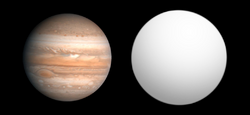Astronomy:WASP-10b
From HandWiki
 Size comparison of WASP-10b with Jupiter. | |
| Discovery | |
|---|---|
| Discovered by | Cameron et al. (SuperWASP) |
| Discovery site | SAAO |
| Discovery date | April 1, 2008 |
| Transit | |
| Orbital characteristics | |
| 0.0371+0.0014−0.0013 AU | |
| Eccentricity | 0.057+0.011−0.005 |
| Orbital period | 3.0927616+1.12E-5−1.82E-5 d |
| Inclination | 86.8+0.6−0.5 |
| 2.737+0.194−0.166 | |
| Star | WASP-10 |
| Physical characteristics | |
| Mean radius | 1.08 ± 0.02 |♃|J}}}}}} |
| Mass | 3.06+0.23−0.21 |♃|J}}}}}} |
| Mean density | 3,220 kg/m3 (5,430 lb/cu yd) |
| 6.93 g | |
| Physics | 1300 |
WASP-10b is an extrasolar planet discovered in 2008 by SuperWASP using the transit method. It takes about 3 days to orbit around WASP-10. Follow-up radial velocity observations showed that it is three times more massive than Jupiter, while the transit observations showed that its radius is only 8% larger than Jupiter's, giving the planet a density more similar to the Moon than a normal gas giant.[1][2]
It is currently the only confirmed planet around WASP-10, as WASP-10c is still unconfirmed.[3]
See also
- SuperWASP
References
- ↑ Johnson; Winn, Joshua N.; Cabrera, Nicole E.; Carter, Joshua A. (2009). "A SMALLER RADIUS FOR THE TRANSITING EXOPLANET WASP-10b". The Astrophysical Journal Letters 692 (2): L100–L104. doi:10.1088/0004-637X/692/2/L100. Bibcode: 2009ApJ...692L.100J.
- ↑ Christian; Gibson, N. P.; Simpson, E. K.; Street, R. A.; Skillen, I.; Pollacco, D.; Collier Cameron, A.; Joshi, Y. C. et al. (December 29, 2008). "WASP-10b: a 3MJ, gas-giant planet transiting a late-type K star". Monthly Notices of the Royal Astronomical Society 392 (4): 1585–1590. doi:10.1111/j.1365-2966.2008.14164.x. Bibcode: 2009MNRAS.392.1585C.
- ↑ "Extrasolar Planets Encyclopaedia - WASP-10". Extrasolar Planets Encyclopaedia. Archived from the original on 2011-01-03. https://web.archive.org/web/20110103072154/http://exoplanet.eu/star.php?st=WASP-10.
External links
- "WASP Planets". 5 December 2013. http://wasp-planets.net/wasp-planets/.
- "WASP-10b". SIMBAD. Centre de données astronomiques de Strasbourg. http://simbad.u-strasbg.fr/simbad/sim-basic?Ident=WASP-10b.
Coordinates: ![]() 23h 15m 58s, +31° 27′ 46″
23h 15m 58s, +31° 27′ 46″
 |
